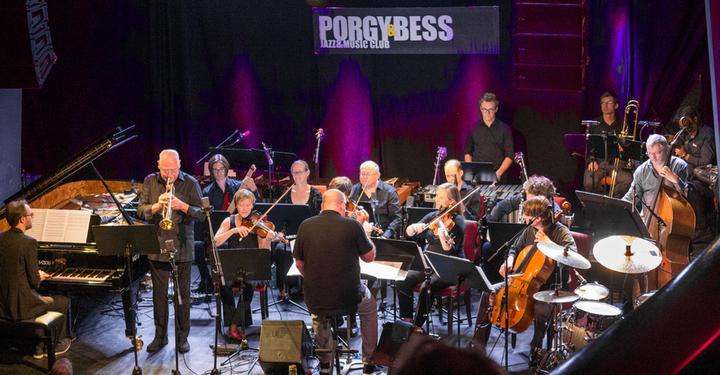Michael Mantler 'For More' – Music for Strings, Piano & Bass Clarinet (A/GB/AUS)
Michael Mantler: compositions, arrangements
David Helbock: piano
Gareth Davis: bass clarinet
Christoph Cech: conductor
String Ensemble
Joanna Lewis, Damir Orascanin, Tomas Novak, Simon Frick: violin
Simon Schellnegger, Anna Magdalena Siakala, Sergio Trujillo, Maximilian Pammer: viola
Arne Kircher, Magdalena Eichmeyer, Maria Frodl: cello
Ö1-Aufnahme, Sendedatum: Ö1-Jazznacht, 18.10.2025, ab 22.05 Uhr (Präsentation: Andreas Felber)
We start the live stream approx. 1/2 hour before the concert begins (real time, no longer available after the end of the concert). By clicking on "Go to livestream" a window will open where you can watch the concert free of charge and without any registration. However, we kindly ask you to support this project via "Pay as you wish". Thank you & welcome to the real & virtual club!
The point of reference for (yet another …) "update" of my music is "For Two," originally recorded in 2010 (released by ECM Records) and performed (at Porgy in 2011) by Bjarne Roupé (guitar) and Per Salo (piano).
These concise and relatively short pieces continued my basic concept of creating music that is in part completely notated, but also involves improvisation. There it was reduced to a minimum, possibly my simplest and most economic interpretation of that idea so far, with only two instruments: the piano representing the strict compositional element with a soloist from contemporary new music (a "classical“ non-improvising pianist), combined with a second player coming from jazz, the guitarist (improvising/freely interpreting).
Taking this music as inspiration, I am now reversing this formal structure, both in terms of improvisation vs. notated music, as well as in size. This time the piano will have great creative freedom, with strictly notated large string ensemble parts accompanying the soloist.
Incorporated into the strings ensemble will be the low underpinning woodwind sound of the bass clarinet, which will, however, also be featured in solo passages inspired by my "Saxophone Concerto" (again with the underlying idea of an "update" ). (Michael Mantler)
Michael Mantler - Optimist without hope
Born in 1943, Michael Mantler is probably the most famous unknown or the most unknown celebrity in Austrian (and international) jazz history. Born and raised in Vienna and Sankt Pölten, the trumpeter and composer emigrated to the USA already at the age of 19 and quickly made contact with the leading New York avant-garde circles of the time. As the life partner and artistic collaborator of jazz icon Carla Bley, he took part in the recording of some of the most important albums in jazz history, including the jazz opera “Escalator over the Hill”. In addition, he built up a complete infrastructure for non-commercial and hard-to-market music - from the Jazz Composers Orchestra Association to the New Music Distribution Service. Despite all these activities, he also succeeded in creating an extensive and high-quality body of musical solo work. He likes to set music to existentialist texts, such as those by Samuel Beckett or Harold Pinter, and dresses them in a melancholy sound characterized by a terraced harmonic structure. Michael Mantler says that he was not interested in words per se, but in expressive voices such as those of Jack Bruce or Marianne Faithfull: “I then had to find something for them to sing, as I was absolutely not interested in wordless vocal exercises. The lyrics had to have clarity, but also be abstract enough to have a certain ambiguity for the listener.”
Michael Mantler is a kind of renaissance man in contemporary jazz: musician, composer, businessman, mover and shaker - and all this with unbridled energy to this day. The Viennese musician Christoph Cech, who has worked intensively with Mantler over the last two decades, says succinctly and pointedly: "If you need to move a mountain, call Michael." (Ö1-Radiokolleg)


